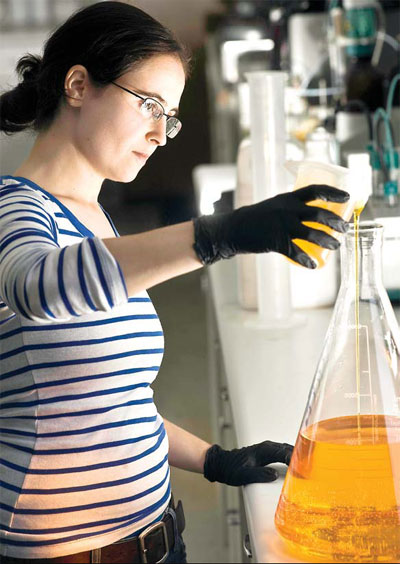Global Biz
Plane makers promote biofuels
By Louise Downing (China Daily)
Updated: 2011-06-07 08:20
 |
Large Medium Small |
|
|
LONDON - Airbus SAS and Boeing Co are talking to farmers and refiners of biofuels in the hopes that cleaner energy may eventually supply as much as 30 percent of the $140 billion aviation fuel market by 2030.
Airbus is working on an Asian supply hub in India by talking with government and airline officials about biofuel ventures, said Paul Nash, the company's head of new energies.
Boeing is negotiating with companies in South America to create supply networks, said Billy Glover, managing director of environmental strategy at Boeing's commercial airplanes unit.
The companies, which manufacture 81 percent of the world's passenger airplanes, are helping to prepare their customers to meet tighter emissions rules. However, they say governments haven't yet provided enough incentives to increase the industry's ability to supply low-pollution biofuels that can rival the price of kerosene jet fuel.
"It's a chicken-and-egg problem," Glover said. "No one is going to produce the feedstock until they have a refinery to take it, and no-one will get the backing for a refinery until they can ensure feedstock availability and a fuel buyer."
Airbus and Boeing are seeking to build up supply chains that will provide biofuels at a competitive cost. The aircraft manufacturers are talking to growers, refiners, distributors, airports and airlines about forming joint ventures and companies that will supply the fuel.
Boeing is seeking government or private "loan guarantees, or agreements where you can establish long-term fuel offtake, to guarantee a market, to make the industry attractive", Glover said.
The European Union is prodding airlines to use cleaner fuels by forcing them to trade and cap emissions permits beginning next year. Mexico, Spain and Singapore have their own incentives. The US government has invested about $348 million since 2004 through grants, loan guarantees, bonds and tax exemptions towards technologies that could produce "clean" jet fuel from non-food second-generation raw materials.
Virgin Atlantic Airways Ltd in 2008 became the first airline to fly a plane using first-generation biofuel from babassu nuts and coconut oil blended with kerosene. The UK carrier said non-food biofuel will take over in the longer term.
Deutsche Lufthansa AG, Air New Zealand Ltd, Air France-KLM Group and Japan Airlines Co have since undertaken test flights. Within the next few weeks, Lufthansa and Airbus will fly passengers from Hamburg to Frankfurt on a plane with one engine 50-percent powered by biofuel.
Airbus estimates airlines may consume 30 percent of their fuel from plant-derived sources by 2030.
Boeing also says that it is possible, though the Chicago-based manufacturer is focusing first on building a biofuel industry that can provide 1 percent of airlines' annual needs by 2015.
Renewable energy, such as electric batteries, hydrogen and solar power, used in other transport sectors won't work in aviation, Glover said. The industry will instead be dependent on cleaner fuel for the near future.
"With fuel being the number one operating expenditure for our airline customers and ongoing continued price volatility, it's in the best interest of our industry and society to aggressively pursue sustainable alternatives," he said.
No single government incentive supports the aviation biofuel industry worldwide.
Bloomberg News
| 分享按鈕 |
